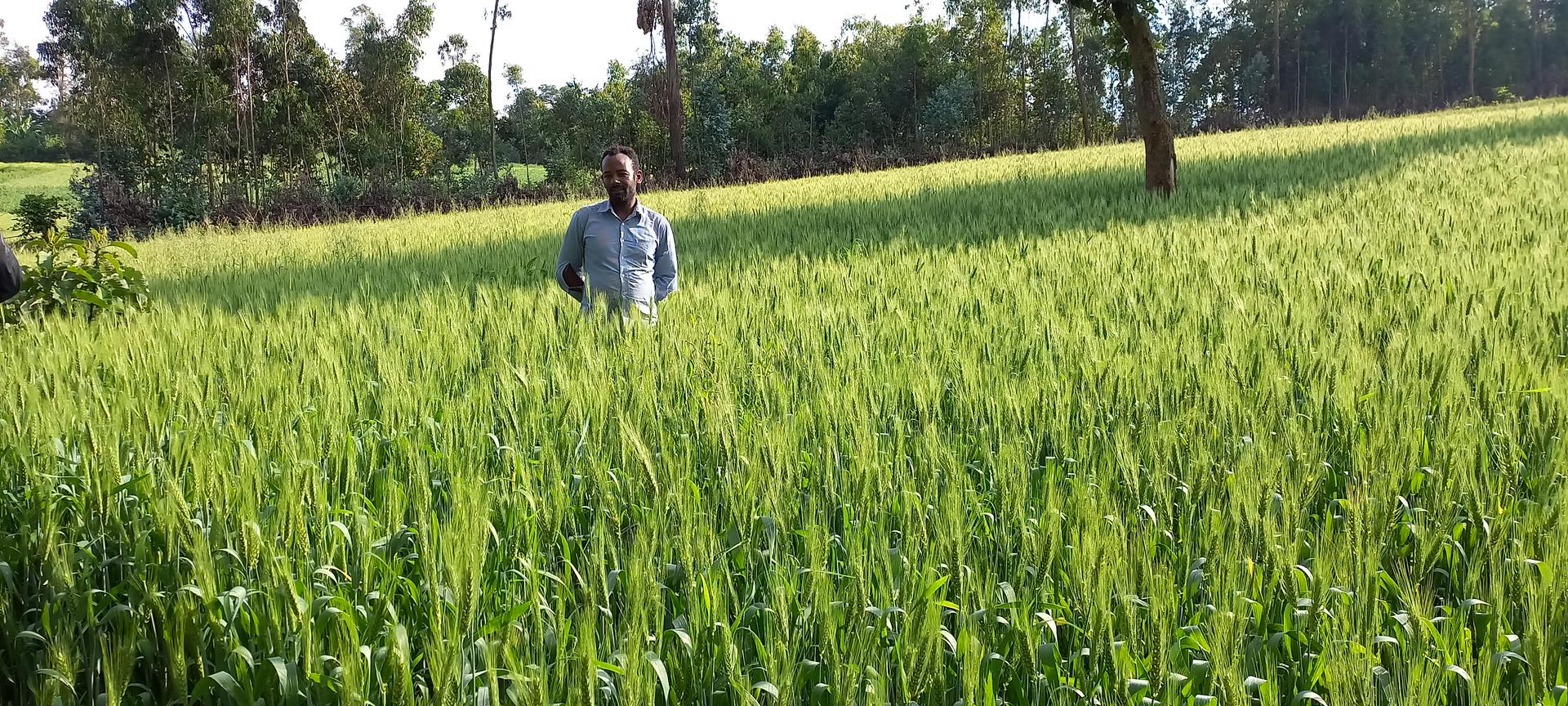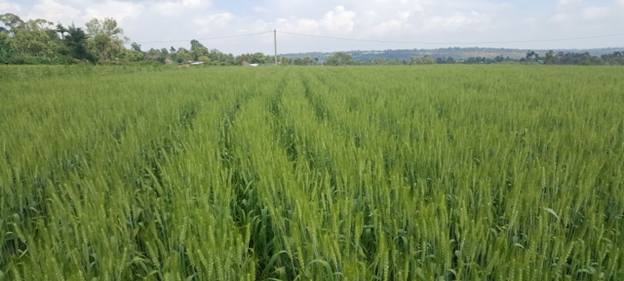From the Field Piloting site and context specific Agro-advisory to transform wheat production in Ethiopia

By Wuletawu Abera, Mohammed Ebrahim, and Feyera M Liben
Mr. Sugebo Forsido, and Mr. Tamire Wangore are both successful wheat farmers at Haysie Kebele in Lemo district Ethiopia. They happily explain the dynamics they both go through. Compared to the neighboring farmers, the two have adopted use of fertilize, and work with development agents through various training sessions.
Mr. Tamire Wangore, expects a yield increase of close to 50% from his 0.5 ha plot due to the use of improved location-specific fertilizer and other agronomic advisories communicated by ABC and Digital Green.
“You can tell from the stand now, how vigorous it is, the use of fertilizer and training sessions on proper and improved farming methods, will definitely improve my year’s grain yield of 3.7-4 tons per hectare significantly.” Mr. Wangore
The two, like millions of smallholder farmers in the highlands of Ethiopia have been struggling to produce sufficient food. Soil fertility is a major constraint mainly due to continuous cultivation of the soils without adequate replenishment of nutrients for years. Nitrogen and phosphorus are the two major plant nutrients that limited wheat productivity in major wheat production belts of the Ethiopian highlands. To replace nutrients removed by crop and poor soil management practice, in the last couple of years, and certain amount of inorganic fertilizers have been applied without consideration of the soil properties, climate, and landscape of the crop environment.
In response to this, ABC has applied state of the art machine learning algorithm using big data and generated location-specific fertilizer rate (LSFR) and planting data agro-advisory information for improved wheat productivity in Ethiopia. Working in hand with demand partner Digital Green, ABC has validated LSFR on 300 farmer fields for wheat across the major wheat belts in the 2021 crop season.
The validation results from crop-cut and farmer participatory on-farm evaluation showed, LSFR significantly increased wheat on field performance and productivity and nutrient and water use efficiency by more than 25% compared to the blanket fertilizer recommendations. Compared to the blanket recommendation, LSFR has also much potential to increase profit per investment in fertilizer, reduce environmental pollution due to nitrous oxide emission, and saves hard currency. As a result, ABC and Digital Green decided to pilot the LSFR on farmer fields to increase its adoption by smallholder farmers in the country.
Together they channeled the LSFR and associated agro-advisory using video and IVR platforms and through training to over thousands of smallholder wheat growers. This year, the LSFR is being piloted and scaled on 3400 farmer fields.

LSFR wheat field at Haysie Kebele
On October 11, 2022, a team of scientists and experts from –ABC, Digital Green, Zonal, Woreda agronomists and extensionists made visits to smallholder farmer fields who applied the LSFR and its associated agro advisory to grow wheat in Lemo Woreda. The team observed wheat plots which received the LSFR and agro advisory are showing very high performance from the vigor and color compared to the neighboring wheat plots managed under blanket fertilizer recommendations.
Similar to Mr Sugebo and Tamire, more than 3400 smallholder farmers have adopted the improved fertilizer and other agronomic recommendations and there is an expected significant improvement of wheat yield productivity. The trainings from Digital Green on wheat production practices packages are well appreciated by the farmers and they are encouraging each other to adopt the improved advisories.
High cost and limited access to fertilizer during the 2021/2022 season are some of the major challenges to follow the recommended advisories.
Acknowledgements
The research is financed by the Supporting Soil Health Initiatives (SSHI) in Ethiopia, funded by the Bill & Melinda Gates Foundation [INV-005460] and managed by the Deutsche Gesellschaft für Internationale Zusammenarbeit (GIZ). The Excellence in Agronomy (EiA) and the Accelerating Impact of CGIAR Climate Research in Africa (AICCRA) projects have also supported different components of this project. We are also indebted to the great support of the ‘coalition of the willing’ members who were instrumental in generating various ideas and providing data sets.
